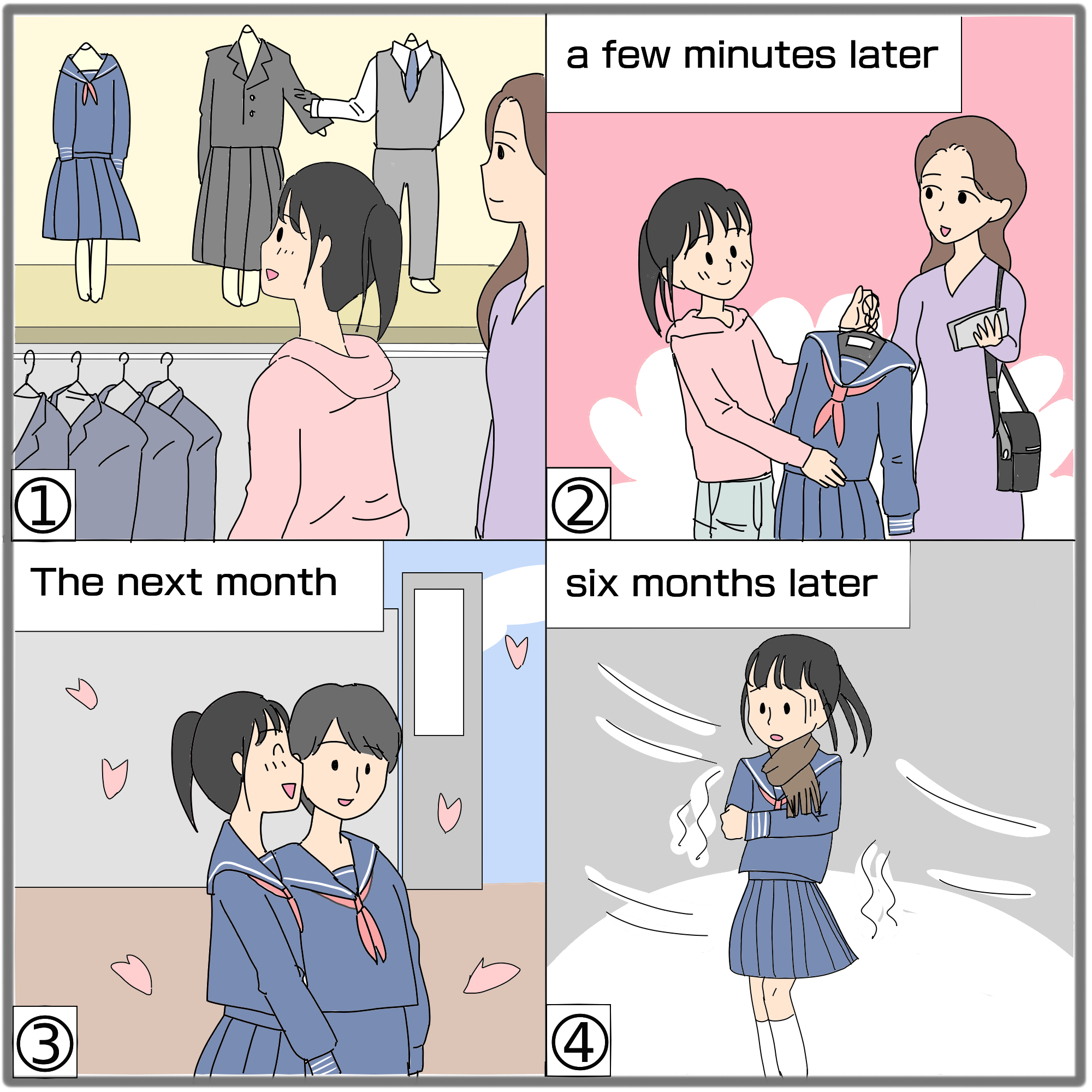PART A_1
Let’s learn new vocabulary. Listen and repeat these words with your tutor.
単語を学習しましょう。講師のあとについて音読してみましょう。
PART A_2
| 1. move 動く、移動する | |
| Would you like to move to a different room? | |
| 2. inconvenience 不便 | |
| Changing trains is just a small inconvenience for us. | |
| 3. availability 利用できること、有効 | |
| Check the availability of the rooms first before checking in. | |
| 4. vacant 空(から)の、空いている | |
| Only a few rooms are vacant in the hotel. | |
| 5. overlook (…を)見晴らす | |
| I’d like a room where I can overlook the ocean, please. | |
PART B_1
Let’s learn today’s phrases. Read the sentences below.
会話表現を学びましょう。以下の文章を音読してみましょう。
PART B_2
I’d like to know if it’s possible for me to move to a different room.
別の部屋に移動することはできますでしょうか。
The air conditioner is not working.
エアコンが作動していません。
PART C_1
Let’s read the dialogue. After that, we’ll switch roles.
以下の会話文を読みましょう。終わったら交代してもう一度読みましょう。
PART C_2
|
Jack
Hello. I’d like to know if it’s possible for me to move to a different room.
|
|
Receptionist
Good day, sir. Is there something wrong with your room?
|
|
Jack
Yeah, the air conditioner is not working.
|
|
Receptionist
We apologize for the inconvenience it has caused. Please give me a minute to check our room availability.
|
|
The receptionist checks for room availability.
|
|
Receptionist
Apologies for the wait. We can give you a vacant room on the 4th floor.
|
|
Jack
Does it overlook the forest?
|
|
Receptionist
Yes, it does.
|
|
Jack
Awesome. I’ll take that room.
|
|
Receptionist
Understood. Here’s the key to your room. Your room number is 407.
|
|
Jack
Thanks so much for the help!
|
PART D_1
Let’s read the dialogue. Read aloud, and fill in the blanks as you remember the sentence you just read.
以下の会話文を読みましょう。先ほど読んだ文を思い出しながら、空欄を埋めて音読しましょう。
PART D_2
|
Jack
Hello. I’d like to know if it’s possible for me to _______________ to a different room.
|
|
Receptionist
Good day, sir. Is there something wrong with your room?
|
|
Jack
Yeah, the air conditioner is not working.
|
|
Receptionist
We apologize for the _______________ it has caused. Please give me a minute to check our room _______________.
|
|
The receptionist checks for room availability.
|
|
Receptionist
Apologies for the wait. We can give you a _______________ room on the 4th floor.
|
|
Jack
Does it _______________ the forest?
|
|
Receptionist
Yes, it does.
|
|
Jack
Awesome. I’ll take that room.
|
|
Receptionist
Understood. Here’s the key to your room. Your room number is 407.
|
|
Jack
Thanks so much for the help!
|
PART E_1
Let’s read the dialogue. Read aloud, and fill in the blanks with the vocabulary and expressions you learned.
以下の会話文を、習った表現や単語を使って穴を埋めながら読みましょう。
PART E_2
|
Mary
Hi. I’d like to request to _______________ to a different room.
|
|
Receptionist
Hello, ma’am. May I know what’s wrong with your room?
|
|
Mary
The water heater in the shower room is not working.
|
|
Receptionist
We apologize for the _______________. Let me check our room availability.
|
|
The receptionist checks for room availability.
|
|
Receptionist
We have a _______________ room on the 5th floor.
|
|
Mary
Does it _______________ the sea?
|
|
Receptionist
Yes.
|
|
Mary
I’ll take it, then. Thanks so much!
|
|
Receptionist
You’re welcome. Here’s the key to your room. Your room number is 511.
|
PART F_1
Let’s do a roleplay. Talk with me according to the situation below, using the expressions you just learned.
ロールプレイをしましょう。以下のシチュエーションに沿って、講師と話をしましょう。この時、今日習った表現を使ってみましょう。
PART F_2
You are staying in a hotel and the mini refrigerator is not working. Request for a room change from your tutor, who will pretend to be a receptionist.
あなたはホテルに滞在しているとミニ冷蔵庫が機能していません。受付のふりをしますあなたの家庭教師から室温の変化、依頼。
PART F_3
PART F_4
You are staying in a hotel but the noise from an adjacent room is distracting. Request for a room change from your tutor, who will pretend to be a receptionist. Also, please make sure you get a room with an ocean view.
あなたはホテルに泊まっていますが、隣の部屋からの騒音が気になります。講師が受付の係のふりをしますので、部屋の変更を依頼してください。また、海の見える部屋であることを確認してください。
PART F_5
PART G_1
Let’s review today’s phrases with your tutor. Read the sentences below.
今日習った会話表現を復習しましょう。下記の文章を読み上げてください。
PART G_2
I’d like to know if it’s possible for me to move to a different room.
別の部屋に移動することはできますでしょうか。
The air conditioner is not working.
エアコンが作動していません。
REVIEW AND FEEDBACK
Now, let us review the things that you learned in this lesson.
ではこのレッスンで学んだことを振り返りましょう。
(Please give a short feedback on how your student did in your class.)
| Grammar 文法 |
Pronunciation 発音 | Vocabulary 単語 |
Comprehension 理解 |
|
|---|---|---|---|---|
 GOOD GOOD |
文法の誤りはほとんどなく、完全な文章で話すことができる | ほとんどの単語をはっきりと正しく発音することができる | 習った表現を適切に使うことができる | 文章を理解し、質問に正しく答えることができる |
 FAIR |
文法の誤りはあるが、完全な文章で話すことができる | 発音の練習が必要な言葉がいくつかある | たまにミスはあるが、習った表現を適切に使うことができる | 文章を完全に理解するのは難しく、質問に正しく答えられないときもある |
 POOR |
文章で話すのは難しく、単語だけで話すことができる | 発音の練習が必要である | 習った単語と表現を少しだけ使うことができる | 文章を理解するのは難しく、質問に答えるのは難しい |







